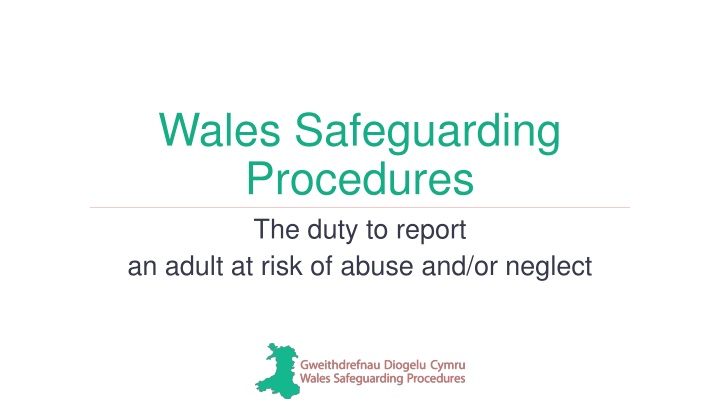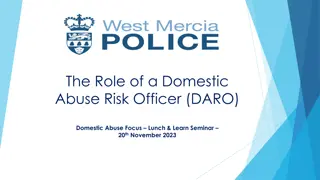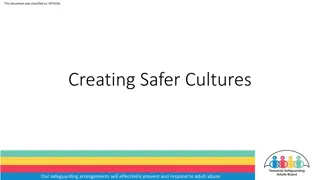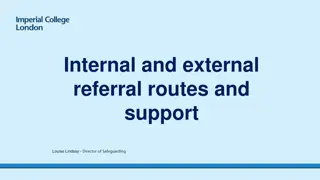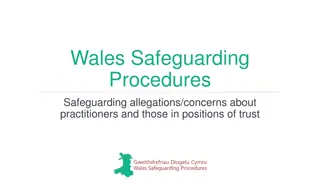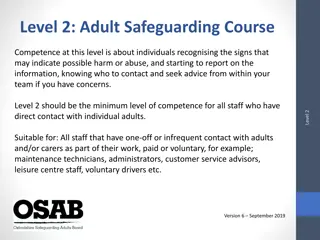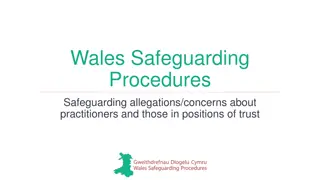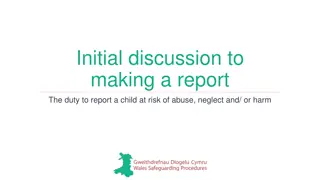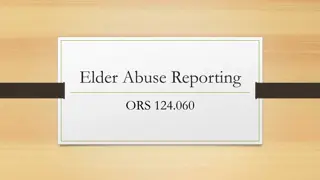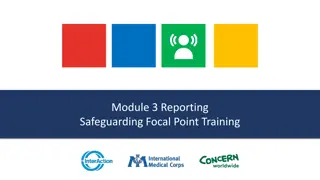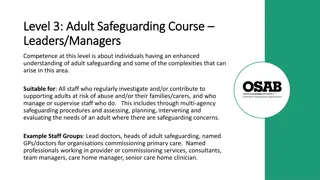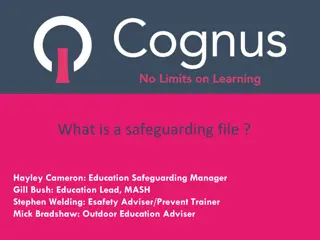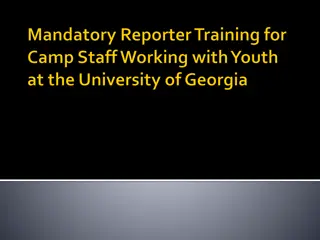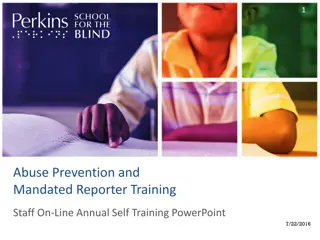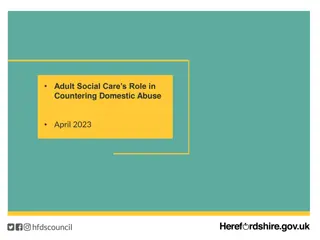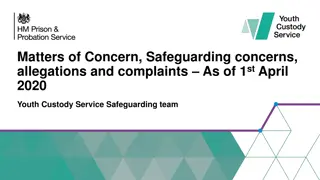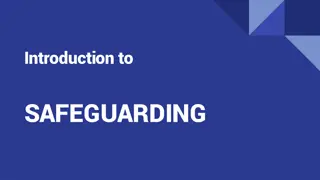Safeguarding Procedures: Reporting Concerns About Adult Abuse
Understanding the duty to report concerns about adult abuse and neglect, the sources of concern, and the importance of recognizing and reporting potential instances of abuse even when evidence may not be clear. The public has a role in reporting as well, and practitioners must take necessary steps to address reported concerns, ensuring the safety and well-being of adults at risk.
Download Presentation

Please find below an Image/Link to download the presentation.
The content on the website is provided AS IS for your information and personal use only. It may not be sold, licensed, or shared on other websites without obtaining consent from the author.If you encounter any issues during the download, it is possible that the publisher has removed the file from their server.
You are allowed to download the files provided on this website for personal or commercial use, subject to the condition that they are used lawfully. All files are the property of their respective owners.
The content on the website is provided AS IS for your information and personal use only. It may not be sold, licensed, or shared on other websites without obtaining consent from the author.
E N D
Presentation Transcript
Wales Safeguarding Procedures The duty to report an adult at risk of abuse and/or neglect
What is a concern? There may not always be evidence of abuse, neglect or harm. You may only suspect (rather than know) an adult is experiencing or at risk of abuse This may be based on: information from different sources over time your professional judgement seemingly insignificant information that may be part of a bigger picture These situations, where there is no clear factual evidence, are referred to as concerns
Remember: Abuse can occur anywhere: in the home, residential or day care, or during leisure activities in private or communal areas in person or online Abuse can be done by anyone: by a practitioner, a volunteer, a carer, a family member or a member of the community
Source: the general public All practitioners have a duty to report any concerns raised by the general public This applies in their work and private lives When a member of the public tells a practitioner (in their professional capacity) about concerns When a neighbour, family member, friend or acquaintance of a practitioner talks about concerns
Managing general public concerns If a member of the public tells you about a concern, you have a duty to report the concern to social services You must not leave it to them or advise the person to contact social services themselves tell the person you have a duty to report these concerns members of the public can remain anonymous in the report, but you should encourage them to give their contact details
Managing general public concerns If you re making a report about information which comes from a member of the public, you must: record exactly what they say record all information they give establish what evidence they have encourage them to provide their contact details explain to them that they can remain anonymous if they want, however this may not always be possible
Source: allegation by adult at risk An adult at risk may make an allegation to a practitioner that: they have been harmed, abused or neglected are aware of another person who may be or is being abused, harmed or neglected The way you manage an allegation is important
Managing an allegation Keep the adult at risk safe Ask questions to decide if it is a safeguarding risk Listen and observe with an open mind Secure and preserve anything you believe might be evidence Explain what will happen next Do not make promises Record what they say to you as soon as possible
Managing an allegation Report the concerns immediately to your line manager and/or your Designated Safeguarding Person (DSP) Ensure you report the concerns immediately to social services Record without delay / within 24 hours: what the person has told you, using their exact words the circumstances in which they made the allegation the date, time, place and people who were present be sure to separate fact from opinion
Seeking advice about a concern The need to seek advice should never delay any emergency action needed to protect an adult
Seeking advice If you are hesitant or unsure whether an adult is at risk, you should seek advice from your agency s designated safeguarding person do not wait for further evidence to confirm or refute these concerns Designated Safeguarding Person (DSP) The identified person within an organisation who: will know whether to raise a safeguarding concern with the local authority will manage any immediate actions to ensure the individual at risk is safe from abuse
Seeking advice You should contact social services directly if: someone would be at risk by the delay if you contacted the DSP first the DSP hasn t taken action and you are still concerned about the adult your concern is about or involves the DSP and you have no other manager to contact
Seeking advice If, having spoken with your DSP, you still don t know whether to report concerns, you should discuss them with social services, who will advise you what to do next It is important to recognise that: seeking advice does not mean you ve made a report youare responsible for making a report you must clearly tell them if you want to make a report telling social services about your concerns does not mean you have made a report
Who has a responsibility to report? We all do! You have a responsibility to contactsocial services or the police if you know or have concerns or suspicions that an adult at risk: is experiencing abuse, neglect or other kinds of harm has experienced abuse, neglect or other kinds of harm is likely to be at risk of abuse, neglect or other kinds of harm This is not a matter of personal choice
Statutory duty to report Statutorymeans it s required by law The Social Services and Well-being (Wales) Act 2014 says relevant partners of the local authority have a statutory (legal) responsibility to report if they have reasonable cause to suspect adults and children, including unborn children, are at risk of abuse Relevant partners include the police, education, local health boards, and NHS trusts
Non-statutory responsibility to report However, anyone who is not a relevant partner must still report any safeguarding concerns they have in the same way as those with a statutory duty to report Safeguarding is everyone s responsibility!
Reporting concerns about a practitioner It is important not to ignore or dismiss suspicions about another practitioner or colleague who may be abusing, neglecting or causing harm to an adult at risk Every practitioner has a responsibility to safeguard adults and that includes protection from abuse by another practitioner This includes in your private life if you become aware of concerning behaviour of a friend, family member or neighbour, who is also a practitioner, you must report your concerns
Making a report Practitioners are expected to make a report to the social services department where the safeguarding concern is thought to have occurred This may mean reporting to a local authority that: is not where the practitioner works is not where the adult at risk lives Unsure which local authority to report to? Contact your local social services for advice
Out of hours Local authorities must be able to receive concerns 24 hours a day, seven days a week The Emergency Duty Team (out of hours team) receives concerns from other agencies, practitioners and members of the public about an adult at risk of harm outside normal working hours Important:If you can t contact a member of the Emergency Duty Team and there is an immediate concern, call 999 for the police without delay
Immediate concerns The safety of the adult at risk always comes first Therefore practitioners should always consider whether there are immediateconcerns about an adult s safety If there are immediate concerns, you must contact the emergency services without delay to protect the adult at risk from serious harm
Immediate concerns You have an immediate concernif you believe: the adult at risk is in imminent danger call 999 for the police without delay they need urgent medical attention call 999 for an ambulance without delay other people may also be in imminent danger call 999 for police without delay someone has committed a crime against an adult at risk call 999 for police without delay
Contacting the police Contact the police without delay if: you have immediate concerns about the safety of the adult at risk / to protect them from possible imminent danger someone has committed a crime against an adult at risk
Contacting the police Regarding capacity and consent of the adult at risk when considering whether you should report a safeguarding offence to the police: if the adult at risk has capacity to make this decision, try to get their consent to make a report to the police if they do not consent,you must respect their decision unless there are justifiable reasons to act against their wishes.
Contacting the police Justifiable reasons tomake a report to the police without consent: the adult at risk is unable to give consent due to coercion or undue influence by someone else there is an overriding public interest (for example, risk to others) it is necessary to prevent imminent danger or distress it is a life-threatening situation
Contacting the police If you make a report to the police and the adult at risk does not have capacity to consent to this decision, you must record the reasons for making this decision in the person s best interests
